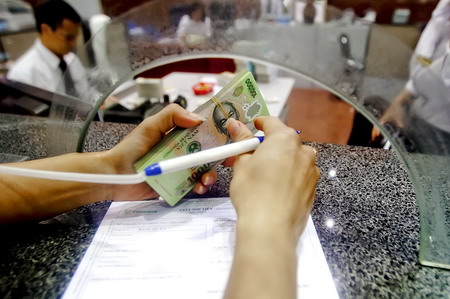
| Shore up confidence in dong: experts | |
At a time when downward pressure on the dong is increasing, it’s necessary to have plans to prevent confidence in the currency from falling further, economists say, advising the government against sugarcoating the situation. Economist Le Tham Duong of the Ho Chi Minh City Banking University said the public needs to see the real picture, including both the best and worst case scenarios. The government should be bolder by announcing its foreign reserves and economic forecasts, allowing people to know exactly what they should expect from the forex market in the next few months, he said. The State Bank of Vietnam needs to tighten control over dollar credit while other government agencies try to curb imports and public spending, Duong told. As it has been clear that there is a rising tension on the dollar exchange rate, the central bank should take immediate actions to regain public confidence before it’s too late, he said. Growing anticipation that exchange rates will fluctuate is not good for the economy, he added. The Asian Development Bank said in a July report that the only currency in the region depreciating significantly against the US dollar was the Vietnamese dong. Most of the region’s currencies appreciated in the first half of 2011, continuing the trend from last year, the bank said. Over the past three months the dong has been quite stable against the greenback, staying under 21,000 per dollar. But the exchange rate is now on a shaky ground. It stood at around 20,834 on Thursday compared with 20,610 a month ago. Analysts said due to a surge in inflation and a wide current account deficit, confidence in the dong has diminished, and there is a strong demand for US dollars and gold. Then came a gold frenzy two weeks ago, prompting the central bank to allow the import of five tons of gold. ABC Securities said in a comment last week that additional gold imports may have a negative impact on the trade balance and put more pressure on the dong. “The rising dollar/dong exchange rate may be due to the cyclical demand of the remaining months of the year, when importers have to settle the payments with their counterparties,” the company added. According to an estimate of the International Monetary Fund, Vietnam’s foreign reserves stand at around US$16-17 billion. Analysts say that while this amount of money can help cover some dollar demand in the short term, it may not be enough to keep exchange rates from fluctuating in the final months of the year, when imports are set to surge. “Although the dong’s value against the US dollar has stabilized in recent months following a series of devaluations in the past two years, the currency will remain under downward pressure until there are clear signs that the trade deficit is narrowing and inflationary pressures are receding,” the Economist Intelligence Unit said August 12 in a statement. For the first eight months of 2011, Vietnam’s trade deficit was $6.62 billion, official statistics show. Huynh The Du, who is with the Fulbright Economics Teaching Program, said Vietnam is always in need of the greenback because of its unresolved trade deficit problem. So even if the dong has stabilized for some time, this will not last long. The demand for dollars is increasing now and if the central bank decides to pump more money into the market to bring down interest rates, there will be even more pressure on the dong, he said. Du suggested the government continue with its tightened monetary policies and refrain from supplying more money to inefficient sectors of the economy so as to help keep the dong stable. Loans in dong rose less than 3 percent in June compared to the end of last year while loans in foreign currency surged by more than 23 percent. Hoang Cong Gia Khanh, a professor at the HCMC University of Economics and Law, said the fast expansion of dollar loans means there will be a surge in dollar demand later for repayment. So after three to six months, the dollar could rise against the dong due to high demand for the foreign currency, he said. “The central bank should allow the exchange rate to change in accordance with supply and demand instead of trying to anchor it,” Khanh said. After that the monetary authority only needs to have a projection of where the exchange rate should be headed and then create plans to keep the rate within that expectation, he said. The message should be sent to the public to make sure people do not expect any devaluation of the dong, he said. Other experts also agreed that forex policies need to be flexible. Efforts to restrain the exchange rate only lead to a dual rate system where an unofficial rate is even more popular than the official one, they said. The exchange rate on the country’s so-called black market has already surged past 21,000. | |
| TN |
